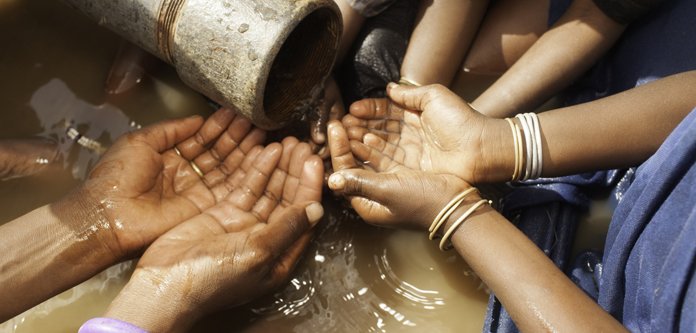By Dhananjayan Sriskandarajah, Chief Executive Oxfam GB.
As delegates gather in Stockholm for World Water Week, I am encouraged to see that their focus will be on ‘including all’. Providing sustainable water and sanitation to everyone on the planet is one of the most critical development challenges we face. But, if we are to meet the global goal to ‘leave no-one behind’, we need a new approach.
Clean water isn’t a luxury; the simple truth is, we cannot end poverty without it. It is the difference between life and death, not just in times of catastrophe, but for those already struggling with the injustice of extreme poverty, each and every day.
Most of the 2.2 billion people still without safely managed drinking water aren’t living in emergency contexts: it isn’t natural disaster or conflict that is denying them clean water, it’s the root drivers of poverty; it’s structural inequality, it’s weak or corrupt governance, it’s an absence of accountability. The fixes we need aren’t just technical; they’re political.
The problem is that so much water and sanitation programming lends itself to donor-pleasing, photogenic, aid-dependent, fundamentally unsustainable quick fixes. Far too many interventions have been shown to fail within the first three years. Not because of faulty equipment, but because of faulty planning.
RELATED: Water quality crisis a global health challenge – REPORT
I’m proud that Oxfam is often first on the scene with clean water and toilets when disaster strikes, often in some of the world’s most difficult places. But our interventions need to go far beyond emergency boreholes to systemic, post-aid solutions that can help to ensure that no one misses out on their basic human right to water.
We can set about doing this, not by installing taps, but perhaps by focusing on TAPS: on technology, accountability, people and systems.
Technological innovations can be deployed to deliver more reliable, efficient and affordable water and sanitation services. Oxfam is increasingly using solar power to reduce costs, cut fuel consumption and ensure that water is available around the clock.
In places like the dry Turkana region of Kenya, where climate change is leaving pastoralists facing ever more prolonged and severe times of drought, our hybrid diesel-solar pump powered boreholes are playing a key role in building community resilience. And, elsewhere in Kenya, we’re using smart sensors to track water deliveries and enable consumers to monitor and report shortages.
Using tools like this is just one of the ways we can kickstart the accountability revolution that will be so crucial to a fairer water future: a world where authorities are accountable for delivering our human right to water and sanitation; where utility providers are accountable for meeting basic standards of service at a fair price; where companies are accountable for compliance with water permits and pollution control; and where NGOs are truly accountable to communities. If the most marginalised and excluded groups are going to benefit from our efforts, then effective, transparent, accountability mechanisms need to come as standard.
READ: Understanding the water-energy-food nexus in a warming climate
And we need to put people, especially the poorest, at the heart of our decision-making, raising their voices, so that those designing and managing services are compelled to respond to their needs from the outset. In particular, we must ensure that women can play a greater role in creating the kind of water and sanitation services that can so radically transform their education, health and economic prospects.
A year on from the first rush of the Rohingya refugee crisis into Bangladesh, a third of women surveyed by Oxfam said they did not feel safe going to collect water or using the emergency toilets and shower cubicles. We needed to listen to their concerns and make changes – screened entrances, locks, lighting – that, though simple on the face of it, helped improve the wellbeing of women living in these camps.
Ultimately, we need to seek systemic sectoral change. We need to tackle the root causes of poor resource allocation and management, supporting market-based approaches that map local contexts, and enable a real understanding of the issues at play, before services are designed.
We must bring together emergency and development, incorporating climate change adaptation and disaster risk reduction into a more holistic approach to water resource management. And we must prioritise the creation of self-sustaining, resilient systems, that continue to function long after the outside aid-tap is turned off.
At Oxfam, we’re committed to making these changes. But there’s no way we can do it alone.
The tangled roots of our global water crisis snake their way through power, poverty and inequality. If we want a water and sanitation system that works for all, then the unsanitised truth is that building more toilets and installing more taps alone just isn’t going to wash.

